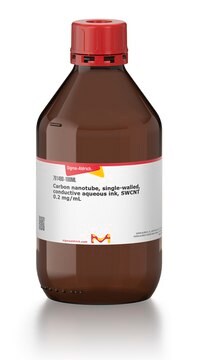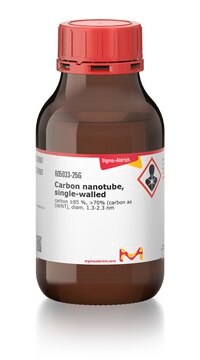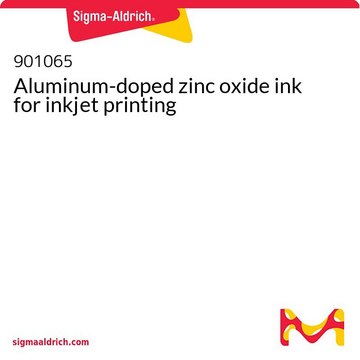792462
Carbon nanotube, single-walled
conductive organic solvent blend ink, 1 mg/mL SWCNT
Synonym(s):
SWCNT Ink, SWNT Ink, SWeNT V2V ink, SWeNT VC101 ink, Single-Walled Carbon Nanotube Ink, conductive ink
About This Item
Recommended Products
product name
Carbon nanotube, single-walled, solvent-based conductive ink, SWCNT, 1 mg/mL
form
viscous liquid (black)
Quality Level
greener alternative product characteristics
Design for Energy Efficiency
Learn more about the Principles of Green Chemistry.
sustainability
Greener Alternative Product
concentration
1 mg/mL
sheet resistance
<1000 Ω/sq, by 4-point probe on prepared (at 87.5% VLT (ohm/sq))
viscosity
17.7 Pa.s(25 °C) (at 10 sec-1 shear rate)
greener alternative category
, Enabling
storage temp.
2-8°C
General description
Application
Legal Information
Signis is a registered trademark of Chasm Advanced Materials, Inc.
CoMoCAT is a trademark of Chasm Advanced Materials, Inc.
CHASM is a trademark of Chasm Advanced Materials, Inc.
Signal Word
Danger
Hazard Statements
Precautionary Statements
Hazard Classifications
Acute Tox. 3 Oral - Acute Tox. 4 Inhalation - Aquatic Acute 1 - Eye Dam. 1 - Flam. Liq. 2 - Skin Corr. 1A - STOT SE 3
Target Organs
Central nervous system
Storage Class Code
3 - Flammable liquids
WGK
WGK 2
Choose from one of the most recent versions:
Already Own This Product?
Find documentation for the products that you have recently purchased in the Document Library.
Customers Also Viewed
Articles
The emerging field of printed electronics requires a suite of functional materials for applications including flexible and large-area displays, radio frequency identification tags, portable energy harvesting and storage, biomedical and environmental sensor arrays,5,6 and logic circuits.
Boron nitride nanotubes (BNNT) are close structural analogs of carbon nanotubes (CNT), which are high aspect ratio nanotubular material, where carbon atoms are alternately substituted by nitrogen and boron atoms.
Professor Rivnay (Northwestern University, USA) discusses using organic mixed conductors as an alternative to efficiently bridge the ionic world of biology with contemporary microelectronics.
A nanocomposite is typically defined as a mixture between a host material (e.g., polymer matrix) and nanofillers with at least one dimension of less than 100 nm.
Our team of scientists has experience in all areas of research including Life Science, Material Science, Chemical Synthesis, Chromatography, Analytical and many others.
Contact Technical Service












